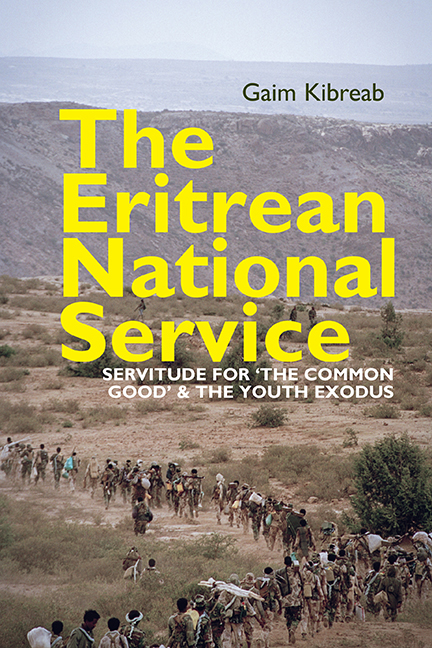Book contents
- Frontmatter
- Dedication
- Contents
- List of Figures and Tables
- Foreword
- Acknowledgements
- List of Acronyms & Abbreviations
- 1 Introduction
- 2 National/Military Service in Africa: Theories and Concepts
- 3 The Government and the Structure of the Eritrean Defence Force
- 4 The Nature of the Eritrean National Service and its Effectiveness as a Fighting Force
- 5 The Eritrean National Service as a Mechanism of Preserving and Transmitting the Core Values of the Liberation Struggle
- 6 The Eritrean National Service: A Vehicle for National Unity and Cohesion
- 7 The Eritrean National Service and Forced Equality
- 8 The Overarching Impact of the Eritrean National Service on the Social Fabric of Eritrean Society
- 9 Impact of the Open-Ended Eritrean National Service on Families and Conscripts
- 10 Conclusion
- Postscript: The UK Upper Tribunal (Immigration and Asylum Chamber) Country Guidance on Eritrea
- References
- Index
- Miscellaneous Endmatter
7 - The Eritrean National Service and Forced Equality
Published online by Cambridge University Press: 11 August 2017
- Frontmatter
- Dedication
- Contents
- List of Figures and Tables
- Foreword
- Acknowledgements
- List of Acronyms & Abbreviations
- 1 Introduction
- 2 National/Military Service in Africa: Theories and Concepts
- 3 The Government and the Structure of the Eritrean Defence Force
- 4 The Nature of the Eritrean National Service and its Effectiveness as a Fighting Force
- 5 The Eritrean National Service as a Mechanism of Preserving and Transmitting the Core Values of the Liberation Struggle
- 6 The Eritrean National Service: A Vehicle for National Unity and Cohesion
- 7 The Eritrean National Service and Forced Equality
- 8 The Overarching Impact of the Eritrean National Service on the Social Fabric of Eritrean Society
- 9 Impact of the Open-Ended Eritrean National Service on Families and Conscripts
- 10 Conclusion
- Postscript: The UK Upper Tribunal (Immigration and Asylum Chamber) Country Guidance on Eritrea
- References
- Index
- Miscellaneous Endmatter
Summary
Each citizen should be accustomed in good time…to considering the fortune of the state as his particular fortune. This perfect equality and this kind of civil fraternity, that makes…all citizens like a single family, makes all equally interested in the good and evil of their fatherland…Love of the fatherland is becoming a kind of amour-propre. Loving the fatherland, one loves oneself, and finally grows to love it more than oneself.
Briez cited in Hippler (2007: 78)The government may do almost whatever it pleases, provided it appeals to the whole community at once; it is the unequal distribution of the weight, not the weight itself, that commonly occasions resistance.
de Tocqueville, Democracy in America (1945: 286)The Eritrean National Service (ENS) is both compulsory and universal, with all citizens between the ages of eighteen and forty required to take part without exception, except for the veterans of the liberation struggle and those who are physically disabled and mentally infirm. The former are only exempted from the military training component of the service, and are still required to perform national service commensurate with their physical and mental capabilities. The aim of this chapter is therefore to examine the extent to which the national service is equally enforced, notwithstanding class, religion, sex, ethnicity, wealth, power, region and family connections. The chapter also examines the prevalence of corruption and the extent to which it is possible to buy oneself out from the service and/or to influence the decision regarding the place of assignment subsequent to the sixmonth military training at Sawa.
In light of the compulsory and universal nature of the ENS, every Eritrean citizen is supposed to be treated equally, regardless of class, gender, religion, region and ethnicity, based on the principle of forced equality. The principle of forced equality or equal sacrifice in bearing the burden of serving in the national service is in theory absolute. Although the ENS, as stipulated in Proclamation No 82/1995, is marked by the principle of absolute equality, there are a few exceptions and exemptions, as well as deferments. For example, Eritrean citizens who performed national service before the promulgation of Proc. No. 82/1995 and all the fighters and armed peasants who ‘spent all their time in the liberation struggle’ are exempted from performing national service.
Information
- Type
- Chapter
- Information
- The Eritrean National ServiceServitude for 'the common good' and the Youth Exodus, pp. 112 - 127Publisher: Boydell & BrewerPrint publication year: 2017
